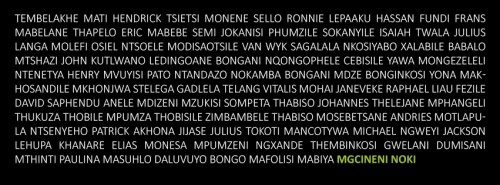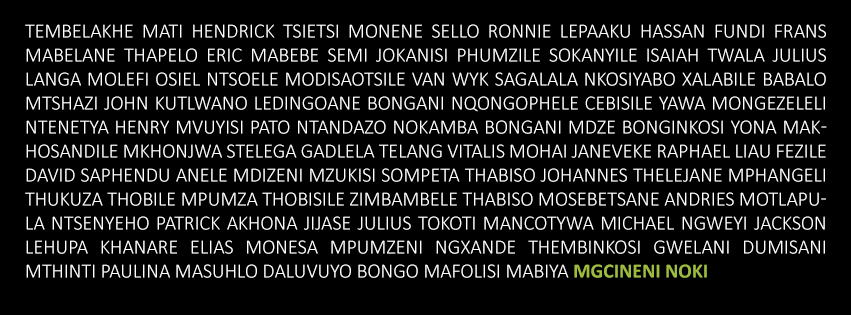When the xenophobic riots of May 2008 rocked South Africa, Thabo Mbeki was roundly criticised for dragging his feet on deploying the army into the townships to resolve widespread violence that the police seemed unable to contain. Not because the army would have been ineffective in quashing the violence, but because he was unwilling to publicly recreate the apartheid-era symbol of soldiers in the townships, recognising the power that the juxtaposition of soldiers and shacks would have in the public imagination. Regardless of the facts of how the 2008 situation differed from the massive insurrections of the 1980s, Mbeki recognised the danger in the symbolism. That there is a power in being perceived to recreate particular moments from the previous regime’s damned past.
Fast forward to the Marikana massacre and comparisons between it and the Sharpeville massacre of 1960, in which outnumbered police killed 69 people when an angry, stone-throwing crowd charged their lines.
Critics are quick to point out that in the detail of the event, Sharpeville is nothing like Marikana. The Sharpeville protestors were directly challenging the abomination that was the apartheid state, and the army went so far to harrass the crowd with aircraft. And in all these observations they are absolutely right. Sharpeville was much, much uglier, and situated in a context that the average (theoretically) rights-enjoying South African would struggle to imagine nowadays.
But as much as Sharpeville-as-detail is unlike Marikana, Sharpeville-as-political-symbol is a different matter. The political symbol that Sharpeville was, and the work that it did – domestically and internationally – is in a very real way being replayed in Marikana.
Both marked moments in the life of the nation where the portion of the country that was able to ignore or rationalise their government’s war on the majority were forced to confront a rupture in their shared national myopia. Sharpeville laid bare the brutality of the system that acted to maintain the law and order of a privileged (white) elite. Where it had been easier to pretend before that there was no malevolence, or that it was exceptional, or justified, Sharpeville dispelled all illusion that the state was not a violent machine, brooking no dissent to an oppressive political/economic arrangement that it was intent on holding in place.
So has it been in Marikana.
That the South African state and its security services have become increasingly violent in maintaining an abominably unequal social order is not a surprise to anyone paying attention. Activists in the Kennedy Road settlement and elsewhere who have dared to defy the government in demanding a dignified lives have been hunted down in the night by shadowy functionaries of the ANC. The DA in the Western Cape wants to send the army into the townships to restore order. The number of South Africans involved in grassroots insurrection has long passed the point of being disturbing. As have the statistics for deaths of such people at the hands of the police.
The state is at war with its poor wherever they become political, and until now we have been able to ignore it. As Sharpeville represented a tear in the fabric of white denial about the costs of their privilege, so might Marikana perform similar work as the moment the ‘New’ South Africa’s sheltered classes learn to confront the costs of their privilege.
Marikana is not Sharpeville as historical reenactment. It is Sharpeville as the moment the privileged must face the naked violence of the system that supports them.
Critics of the comparison to Sharpeville are literalists, and therefore miss the point. Making the link between the two is a political claim. A furious demand that the beneficiaries of South Africa’s criminally unequal economic system confront the scale of the crime that they are party to perpetrating on the majority. It’s not about whether the two events unfolded identically, or whether the death tolls were the same. It’s about establishing the claim that this is an event on its way to becoming a source of profound political action. The thing that cannot be ignored, and out of which which the previously acquiescent must become radical.
Much is at stake here, because winning the comparison to Sharpeville in the public imagination is to win both the recognition that the state is violent and must be reined in, and to force self reflection by rational, ethical citizens who must realise that they will be held accountable for their action or inaction from this moment forward. Events like Sharpeville made it impossible for our parents to claim ignorance about the violence of the apartheid state and the abominable political/economic structure that made such repression necessary. Marikana has made it impossible for us to claim to the next generation that we were unaware that our own lives rest on the exploitation of and inhumanity towards the majority of South Africa’s citizens.
Predictably, there is outrage at appropriating a memory from our history and throwing it back at the current government. “The current government is vastly different to that of the old South Africa” runs the refrain. But there is a difference between “we are vastly different to the old South Africa” and “we have changed in all respects”. And it is in the respects that the state and nation have not changed, but simply been re-peopled – that the comparisons to apartheid symbols like Sharpeville burn most incandescent. It is for good reason that the symbolic language of the struggle against apartheid returns, and that Fanon and Biko are being embraced from the lecture room to the shack.
We are still a nation structured to profit from the exploitation of the majority. The state still uses violence to crush those who wish for a dignified life.
For these continuities with our abominable past, Marikana is our Sharpeville. That moment when the mask is removed, to find that the face of the nation has changed, but some of its most terrible scars remain.


